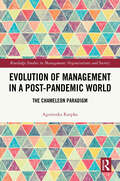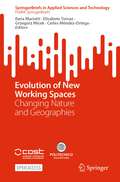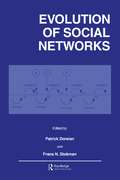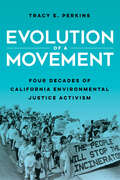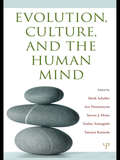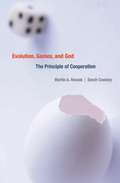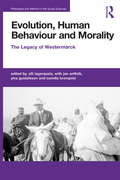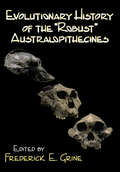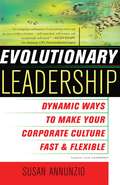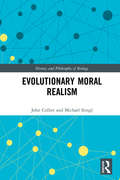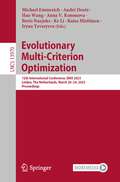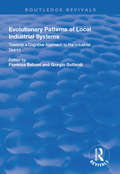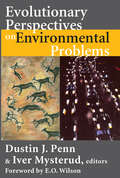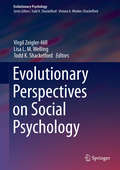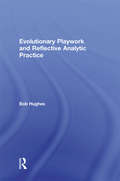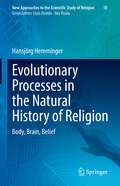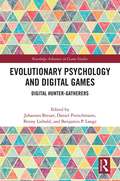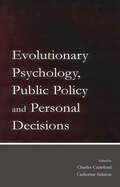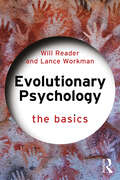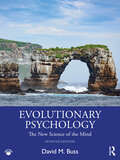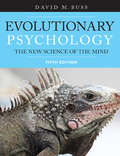- Table View
- List View
Evolution of Digitized Societies Through Advanced Technologies (Advanced Technologies and Societal Change)
by Arindam Biswas T. P. Singh Amitava Choudhury Mrinal AnandThis book provides an understanding of the evolution of digitization in our day to day life and how it has become a part of our social system. The obvious challenges faced during this process and how these challenges were overcome have been discussed. The discussions revolve around the solutions to these challenges by leveraging the use of various advanced technologies. The book mainly covers the use of these technologies in variety of areas such as smart cities, healthcare informatics, transportation automation, digital transformation of education. The book intends to be treated as a source to provide the systematic discussion to the bouquet of areas that are essential part of digitized societies. In light of this, the book accommodates theoretical, methodological, well-established, and validated empirical work dealing with various related topics.
Evolution of Management in a Post-Pandemic World: The Chameleon Paradigm (Routledge Studies in Management, Organizations and Society)
by Agnieszka RzepkaDeveloped by Agnieszka Rzepka, the Chameleon Paradigm is the culmination of twenty years of global research which identifies critical factors essential for organizational success in a volatile marketplace. The Paradigm provides a roadmap for organizations, addressing key elements necessary for thriving in a 5.0 reality. With market trends pushing companies towards sustainable, human-centric industries, the book argues that organizations should function as living organisms, where one failing component can disrupt the whole system.Rzepka’s framework combines nine interdependent elements—leadership, innovation, relationships, culture, agility, capital, competence, knowledge, and strategy. The Chameleon Paradigm emphasizes the evolution in management models, shifting societal consciousness, and new workforce dynamics. The book analyzes companies that successfully navigated the pandemic’s challenges, offering a model for resilient and innovative organizations. The book highlights discrepancies between recommended and actual practices in contemporary business and draws a conclusion that effective 21st-century leadership requires agility, proactive behavior, and a growth-focused approach. The accompanying verification tool allows organizations to assess their alignment with the paradigm and identify areas for improvement.The monograph offers key management models and practical recommendations that can be implemented by managers and SMEs and will be of interest to researchers, academics, professionals, and students in the fields of organizational studies, leadership, management, and innovation. By applying Rzepka’s model, managers can design, build, and operate innovative and resilient local and global organizations.
Evolution of New Working Spaces: Changing Nature and Geographies (SpringerBriefs in Applied Sciences and Technology)
by Ilaria Mariotti Grzegorz Micek Elisabete Tomaz Carles Méndez-OrtegaThis open access book provides multidisciplinary perspectives on the changing dynamics of new working spaces, with insights from various European countries and observing critical theoretical approaches. Divided into two main parts, the first part focuses on the different typologies of new working spaces, identifying the changing nature of these spaces and associated concepts, taxonomies, and specific approaches to this phenomenon. The second part analyzes the location of new working spaces, examining its recent evolution and identifying new factors and geographies, offering an additional empirical analysis of different European realities. The research included in this book contributes to the current discussion of new forms and geographies of work and their impact on the territories and related policies.
Evolution of Social Networks
by Patrick Doreian Frans N. StokmanThis book answers the question of whether we can apply evolutionary theories to our understanding of the development of social structures. Social networks have increasingly become the focus of many social scientists as a way of analyzing these social structures. While many powerful network analytic tools have been developed and applied to a wide range of empirical phenomena, understanding the evolution of social organization still requires theories and analyses of social network evolutionary processes. Researchers from a variety of disciplines have combined their efforts in what is an indication of some very promising future research and the work represented in this volume provides a basis for a sustained analysis of the evolution of social life.
Evolution of a Movement: Four Decades of California Environmental Justice Activism
by Tracy E. PerkinsDespite living and working in California, one of the county's most environmentally progressive states, environmental justice activists have spent decades fighting for clean air to breathe, clean water to drink, and safe, healthy communities. Evolution of a Movement tells their story—from the often-raucous protests of the 1980s and 1990s to activists' growing presence inside the halls of the state capitol in the 2000s and 2010s. Tracy E. Perkins traces how shifting political contexts combined with activists' own efforts to institutionalize their work within nonprofits and state structures. By revealing these struggles and transformations, Perkins offers a new lens for understanding environmental justice activism in California. Drawing on case studies and 125 interviews with activists from Sacramento to the California-Mexico border, Perkins explores the successes and failures of the environmental justice movement in California. She shows why some activists have moved away from the disruptive "outsider" political tactics common in the movement's early days and embraced traditional political channels of policy advocacy, electoral politics, and working from within the state's political system to enact change. Although some see these changes as a sign of the growing sophistication of the environmental justice movement, others point to the potential of such changes to blunt grassroots power. At a time when environmental justice scholars and activists face pressing questions about the best route for effecting meaningful change, this book provides insight into the strengths and limitations of social movement institutionalization.
Evolution, Culture, and the Human Mind
by Mark SchallerAn enormous amount of scientific research compels two fundamental conclusions about the human mind: The mind is the product of evolution; and the mind is shaped by culture. These two perspectives on the human mind are not incompatible, but, until recently, their compatibility has resisted rigorous scholarly inquiry. Evolutionary psychology documents many ways in which genetic adaptations govern the operations of the human mind. But evolutionary inquiries only occasionally grapple seriously with questions about human culture and cross-cultural differences. By contrast, cultural psychology documents many ways in which thought and behavior are shaped by different cultural experiences. But cultural inquires rarely consider evolutionary processes. Even after decades of intensive research, these two perspectives on human psychology have remained largely divorced from each other. But that is now changing - and that is what this book is about. Evolution, Culture, and the Human Mind is the first scholarly book to integrate evolutionary and cultural perspectives on human psychology. The contributors include world-renowned evolutionary, cultural, social, and cognitive psychologists. These chapters reveal many novel insights linking human evolution to both human cognition and human culture – including the evolutionary origins of cross-cultural differences. The result is a stimulating introduction to an emerging integrative perspective on human nature.
Evolution, Games, and God
by Sarah Coakley Martin A. NowakEvolution, Games, and God explores how cooperation and altruism, alongside mutation and natural selection, play a critical role in evolution, from microbes to human societies. Inheriting a tendency to cooperate and self-sacrifice on behalf of others may be as beneficial to a population’s survival as the self-preserving instincts of individuals.
Evolution, Human Behaviour and Morality: The Legacy of Westermarck (Philosophy and Method in the Social Sciences)
by Olli Lagerspetz Jan Antfolk Ylva Gustafsson Camilla KronqvistThis book highlights the recent re-emergence of Edward Westermarck's work in modern approaches to morality and altruism, examining his importance as one of the founding fathers of anthropology and as a moral relativist, who identified our moral feelings with biologically-evolved retributive emotions. Questioning the extent to which current debates on the relationship between biology and morality are similar to those in which Westermarck himself was involved, the authors ask what can be learnt from his arguments and from the criticism that he encountered. Drawing on Westermarck's manuscripts and papers as well as his published work, the authors show the importance of situating debates, whether modern or classical, in their correct methodological and philosophical context. This volume is a rigorous assessment of the ways in which morality is connected with human biological nature. It plays close attention to the development of debates in this field and will appeal to scholars of sociology, anthropology and philosophy.
Evolution, Human Behaviour and Morality: The Legacy of Westermarck (Philosophy and Method in the Social Sciences)
by Olli Lagerspetz Jan Antfolk Ylva Gustafsson Camilla KronqvistThis book highlights the recent re-emergence of Edward Westermarck's work in modern approaches to morality and altruism, examining his importance as one of the founding fathers of anthropology and as a moral relativist, who identified our moral feelings with biologically-evolved retributive emotions.Questioning the extent to which current debates on the relationship between biology and morality are similar to those in which Westermarck himself was involved, the authors ask what can be learnt from his arguments and from the criticism that he encountered. Drawing on Westermarck's manuscripts and papers as well as his published work, the authors show the importance of situating debates, whether modern or classical, in their correct methodological and philosophical context.This volume is a rigorous assessment of the ways in which morality is connected with human biological nature. It plays close attention to the development of debates in this field and will appeal to scholars of sociology, anthropology and philosophy.
Evolutionary History of the Robust Australopithecines
by Frederick E. GrineIn paleoanthropology the group of hominids known as the "robust" australopithecines has emerged as one of the most interesting. Through them we have the opportunity to examine the origin, natural history, and ultimate extinction of not just a single species, but of an entire branch in the hominid fossil record. It is generally agreed that the human lineage can be traced back to this group of comparatively small-brained, large-toothed creatures. This volume focuses on the evolutionary history of these early hominids with state-of-the-art contributions by leading international authorities in the field. Although a case can be made for a "robust" lineage, the functional and taxonomic implications of the morphological features are subject to vigorous disagreement. An area of lively debate is the possible causal relationship between the presence of early Homo and the origin, evolution, and virtual extinction of "robust" australopithecines.This volume summarizes what has been learned about the evolutionary history of the "robust" australopithecines in the 50 years since Robert Broom first encountered the visage of a new kind of ape-man from Kromdraai. New discoveries from Kromdraai to Lomekwi have served to keep us aware that the paleontological record for hominid evolution is hardly exhausted. Because of such finds no single volume can hope to stand as a summary on the "robust" australopithecines for very long, but this classic volume comes close to achieving this goal. The book sheds new light upon some old questions and also acts to provide new questions. The answers to those questions bring us closer to a fuller understanding and appreciation of the origins, evolution, and ultimate demise of the "robust" australopithecines. Since the "robust" australopithecines most likely stand as our closest relatives, a better understanding of their origin, history, and demise serves to provide heightened appreciation of the course of human evolution itself. This definitive volume addresses the questions and problems surrounding this important lineage.
Evolutionary Leadership
by Susan AnnunzioIS YOUR CORPORATE CULTURE SUFFOCATING YOU? Written by one of the world's leading management consultants, Evolutionary Leadership offers a vibrant style of leadership that will enlighten executives and inspire them to rethink their companies in an ever-changing economy. With business practices changing every day, companies must create environments of speed and flexibility that will engage employees and allow radical ideas to thrive. Susan Annunzio takes readers beyond typical management-speak, offering a blueprint for leading by promoting environments that succeed amid constant change. igniting passion for saving America's traditional businesses. thinking about where your company is heading and how to get there. With real-world examples, Annunzio shows how to create a more productive working environment by attacking traditional priorities in unconventional ways.
Evolutionary Leadership: Dynamic Ways to Make Your Corporate Culture Fast a
by Susan AnnunzioIS YOUR CORPORATE CULTURE SUFFOCATING YOU?Written by one of the world's leading management consultants, Evolutionary Leadership offers a vibrant style of leadership that will enlighten executives and inspire them to rethink their companies in an ever-changing economy. With business practices changing every day, companies must create environments of speed and flexibility that will engage employees and allow radical ideas to thrive. Susan Annunzio takes readers beyond typical management-speak, offering a blueprint for leading bypromoting environments that succeed amid constant change.igniting passion for saving America's traditional businesses.thinking about where your company is heading and how to get there.With real-world examples, Annunzio shows how to create a more productive working environment by attacking traditional priorities in unconventional ways.
Evolutionary Moral Realism (History and Philosophy of Biology)
by John Collier Michael StinglAgainst standard approaches to evolution and ethics, this book develops the idea that moral values may find their origin in regularly recurring features in the cooperative environments of species of organisms that are social and intelligent. Across a wide range of species that are social and intelligent, possibilities arise for helping others, responding empathetically to the needs of others, and playing fairly. The book identifies these underlying environmental regularities as biological natural kinds and as natural moral values. As natural kinds, moral values help to provide more complete explanations for the selection of traits that arise in response to them. For example, helping in an aquatic environment is quite different than helping in an arboreal environment, and so we can expect the selection of traits for helping to reflect these underlying environmental differences. With the human ability to name, talk, and reason about important features of our environment, moral values become part of moral discourse and argument, helping to produce coherent systems of moral thought. Combining a naturalistic approach to morality with an equal emphasis on moral argument and truth, this book will be of interest to philosophers and historians of biology, theoretical biologists, comparative psychologists, and moral philosophers.
Evolutionary Multi-Criterion Optimization: 12th International Conference, EMO 2023, Leiden, The Netherlands, March 20–24, 2023, Proceedings (Lecture Notes in Computer Science #13970)
by Michael Emmerich Boris Naujoks Hao Wang André Deutz Kaisa Miettinen Ke Li Anna V. Kononova Iryna YevseyevaThis book constitutes the refereed proceedings of the 12th International Conference on Evolutionary Multi-Criterion Optimization, EMO 2022 held in Leiden, The Netherlands, during March 20-24, 2023. The 44 regular papers presented in this book were carefully reviewed and selected from 65 submissions. The papers are divided into the following topical sections: Algorithm Design and Engineering; Machine Learning and Multi-criterion Optimization; Benchmarking and Performance Assessment; Indicator Design and Complexity Analysis; Applications in Real World Domains; and Multi-Criteria Decision Making and Interactive Algorithms..
Evolutionary Patterns of Local Industrial Systems (Routledge Revivals)
by Fiorenza Belussi Giorgio GottardiPulished in 2000, a selection of contributions presented in 1998 at the conference of Udine entitled, "The Development of Industrial Districts in Italy". The theoretical aim of the book is to explain the dynamic mechanism of the growth of Italian "industrial districts" shifting attention from "Marshallian industrial districts", where focus is not just on the decentralization of production among small-batch firms. Determinant factors explaining growth seem related to the ways in which firms explore the markets, learn tacit knowledge, network with subcontractors and make incremental innovations. In substance, the work offers a cognitive approach to the issue of industrial districts.
Evolutionary Perspectives on Environmental Problems
by E. O. Wilson Dustin J. Penn Iver MysterudThe twenty-first century presents an increasing number of environmental problems, including toxic pollution, global warming, destruction of tropical forests, extinction of biological diversity, and depletion of natural resources. These environmental problems are generally due to human behavior, namely over-consumption of resources and overpopulation. Designing effective policies to address these problems requires a deep understanding of human behavior as well as ecology. This in turn requires considerations of human nature, and the evolutionary "design" of the human mind.Evolutionary research on human behavior has profound implications for the environmental sciences. The aim of this collection is to bring together a variety of chapters that show how and why. Part 1, "Human Nature and Resource Conservation," addresses environmental problems from different evolutionary perspectives. Part 2, "The Ecological Noble Savage Hypothesis," examines the notion that our environmental problems are due to Western culture, and that our ancestors and people in indigenous societies lived in harmony with nature until the corrupting influences of Western culture. Part 3, "The Tragedy of the Commons," explores the conservation of common-pool or open-access natural resources, such as fisheries, forests, grazing lands, freshwater, and clean air. Part 4, "The Evolution of Discounting and Conspicuous Consumption," looks at the problem of explaining why people are so ecologically short-sighted and why people in developed countries consume so many resources. Part 5, "Overpopulation and Fertility Declines," addresses the evolution of human reproductive decisions. Part 6, "Biophilia," aims to explain why people cherish nature as well as destroy it.The goal of this volume is to introduce environmental thinkers to evolutionary perspectives on human behavior, and the new interdisciplinary sciences of evolutionary psychology and behavioral ecology. This reader aims to help bridge
Evolutionary Perspectives on Social Psychology
by Todd K. Shackelford Virgil Zeigler-Hill Lisa L. M. WellingThis wide-ranging collection demonstrates the continuing impact of evolutionary thinking on social psychology research. This perspective is explored in the larger context of social psychology, which is divisible into several major areas including social cognition, the self, attitudes and attitude change, interpersonal processes, mating and relationships, violence and aggression, health and psychological adjustment, and individual differences. Within these domains, chapters offer evolutionary insights into salient topics such as social identity, prosocial behavior, conformity, feminism, cyberpsychology, and war. Together, these authors make a rigorous argument for the further integration of the two diverse and sometimes conflicting disciplines. Among the topics covered: How social psychology can be more cognitive without being less social. How the self-esteem system functions to resolve important interpersonal dilemmas. Shared interests of social psychology and cultural evolution. The evolution of stereotypes. An adaptive socio-ecological perspective on social competition and bullying. Evolutionary game theory and personality. Evolutionary Perspectives on Social Psychology has much to offer students and faculty in both fields as well as evolutionary scientists outside of psychology. This volume can be used as a primary text in graduate courses and as a supplementary text in various upper-level undergraduate courses.
Evolutionary Playwork and Reflective Analytic Practice
by Bob HughesPlay is a crucial component in the development of all children. In this comprehensive and accessible text, Bob Hughes explores the complexities of children's play, its meaning and purpose, and argues that adult-free play is essential for the psychological well-being of the child. The book divides into three main sections. The first examines the fundamentals of evolutionary playwork, from creating the right play environment to issues of safety and participation. Secondly, the book explores the theory underlying playwork. Finally, the book offers new models to help the playworker develop their own professional practice. Throughout the text, the author brings his argument to life with vivid reflections on a lifetime's experience of play and playwork. Evolutionary Playwork and Reflective Analytic Practice is the first book of its kind, and represents essential reading for all playwork students, practitioners and researchers. It also incorporates dedicated material for parents looking to better understand and enhance the development of their children.
Evolutionary Processes in the Natural History of Religion: Body, Brain, Belief (New Approaches to the Scientific Study of Religion #10)
by Hansjörg HemmingerThe study of religion by the humanities and social sciences has become receptive for an evolutionary perspective. Some proposals model the evolution of religion in Darwinian terms, or construct a synergy between biological and non-Darwinian processes. The results, however, have not yet become truly interdisciplinary. The biological theory of evolution in form of the Extended Evolutionary Synthesis (EES) is only sparsely represented in theories published so far by scholars of religion. Therefore this book reverses the line of view and asks how their results assort with evolutionary biology:How can the subject area “religion” integrated into behavioral biology?How is theory building affected by the asymmetry between the scarce empirical knowledge of prehistoric religion, and the body of knowledge about extant and historic religions?How does hominin evolution in general relate to the evolution of religion? Are there evolutionary pre-adaptations?Subsequent versions of evolutionary biology from the original Darwinism to EES are used in interdisciplinary constructs. Can they be integrated into a comprehensive theory?The biological concept most often used is co-evolution, in form of a gene-culture co-evolution. However, the term denotes a process different from biological co-evolution.Important EES concepts do not appear in present models of religious evolution: e.g. neutral evolution, evolutionary drift, evolutionary constraints etc. How to include them into an interdisciplinary approach?Does the cognitive science of religion (CSR) harmonize with behavioral biology and the brain sciences?Religion as part of human culture is supported by a complex, multi-level behavioral system. How can it be modeled scientifically? The book addresses graduate students and researchers concerned about the scientific study of religion, and biologist interested in interdisciplinary theory building in the field.
Evolutionary Psychology and Digital Games: Digital Hunter-Gatherers (Routledge Advances in Game Studies)
by Johannes Breuer Daniel Pietschmann Benny Liebold Benjamin P. LangeEvolutionary Psychology and Digital Games: Digital Hunter-Gatherers is the first edited volume that systematically applies evolutionary psychology to the study of the use and effects of digital games. The book is divided into four parts: Theories and Methods Emotion and Morality Social Interaction Learning and Motivation These topics reflect the main areas of digital games research as well as some of the basic categories of psychological research. The book is meant as a resource for researchers and graduate students in psychology, anthropology, media studies and communication as well as video game designers who are interested in learning more about the evolutionary roots of player behaviors and experiences.
Evolutionary Psychology, Public Policy and Personal Decisions
by Charles Crawford Catherine SalmonDuring the last 15 years, human sociobiology has metamorphosed into evolutionary psychology. It is concerned with the social problems and stresses hominid and primate ancestors encountered, the psychological mechanisms natural selection shaped to deal with these stresses, and the way those ancient mechanisms work now. Evolutionary psychologists are making great progress in expanding the understanding of human nature, however, this knowledge has had little impact on policymakers and legislators. Supreme Court justices and managers seldom consult evolutionary psychologists to help with their deliberations. When faced with private decisions few individuals ask themselves how a Darwinian perspective might help them. This volume's aim is to start the process of using theory and findings of evolutionary psychology to help make the world a better place to live. This book takes evolutionary psychology explicitly into applied areas in a way no other book has. It includes a reasonable scope of applications from pornography to psychopaths and from morality to sex differences in the workplace. An applications section provides concrete ideas for dealing with social and policy issues, including chapters on women in the workplace, rape, and child support. Providing good coverage of basic issues and theory of the field, this book gives lay people and law/policymakers appropriate background to fully understand the applications chapters. Part II provides information on basic psychological mechanisms for group living--including chapters on emotions, reciprocity and legal reasoning, and self deception--that impact on how well public policy and law function. The material in the first two sections provide an intellectual basis for the chapters in the third part of the book which deals with the application of evolutionary psychology to a variety of substantive areas related to public policy and personal decisions. A political scientist concludes the book with a commentary on evolutionary psychology and public policy. The book is designed to serve as a stand-alone text in evolutionary psychology and public policy that can be used in a variety of disciplines, such as psychology, social work, law and psychology, and public policy.
Evolutionary Psychology: The Basics (The Basics)
by Lance Workman Will ReaderEvolutionary Psychology: The Basics is a jargon-free and accessible introduction to evolutionary psychology, which examines behaviour, thoughts, and emotions in relation to evolutionary theory. Reader and Workman outline how evolutionary thinking can enhance the core areas of psychology: social, developmental, biological, cognitive, and individual differences/abnormal psychology. Covering topics such as genetics and natural selection, mate choice, culture, morality, mental health, and childhood, among others, the book integrates psychology into the biological sciences and explains the different approaches in the field by evaluating current and past evolutionary research and theory. Key studies and theories are explored in an accessible way, with the work of key evolutionary and behavioural scientists from Darwin to Dawkins examined and explained.Including a glossary and further reading, this is the essential introduction to evolutionary psychology for students of psychology and related areas, and academics and researchers, as well as anyone interested in learning more about this fascinating field.
Evolutionary Psychology: The New Science of the Mind
by David M. BussWhere did we come from?What is our connection with other life forms?What are the mechanisms of mind that define what it means to be a human being?In the seventh edition of this revolutionary textbook, David M. Buss examines human behavior from an evolutionary perspective, providing students with the conceptual tools needed to study evolutionary psychology and apply them to empirical research on the human mind. Content is organised by topic, beginning with the challenges of survival, mating, parenting, and kinship; progressing to challenges of group living, including cooperation, aggression, sexual conflict and status, prestige, and social hierarchies.Key features of this edition include:• Updated and enhanced material based on an explosion of new theories and research, including dozens of new references.• Expanded coverage of topics including socioecology, behavior, emotions, and gender.• Exploration of evolutionary mismatches in several domains such as survival, kinship, and mating, including a discussion of internet dating.With a wealth of student-friendly pedagogy including critical thinking questions and case study boxes supporting the application of evolutionary psychology to real-world situations, this is an invaluable resource for undergraduates studying psychology, biology, and anthropology. The textbook is also supported by a range of instructor resources, including PowerPoint slides, a test bank, and an instructor’s manual, to help students achieve their higher learning goals.
Evolutionary Psychology: The New Science of the Mind (Mysearchlab Series 15% Off Ser.)
by David M BussWhere did we come from? What is our connection with other life forms? What are the mechanisms of mind that define what it means to be a human being? Evolutionary psychology is a revolutionary new science, a true synthesis of modern principles of psychology and evolutionary biology. Since the publication of the award-winning first edition of Evolutionary Psychology, there has been an explosion of research within the field. In this book, David M. Buss examines human behavior from an evolutionary perspective, providing students with the conceptual tools needed to study evolutionary psychology and apply them to empirical research on the human mind. This edition contains expanded coverage of cultural evolution, with a new section on culture–gene co-evolution, additional studies discussing interbreeding between modern humans and Neanderthals, expanded discussions of evolutionary hypotheses that have been empirically disconfirmed, and much more! Evolutionary Psychology features a wealth of student-friendly pedagogy including critical-thinking questions and case study boxes designed to show how to apply evolutionary psychology to real-life situations. It is also accompanied by a thoroughly updated companion website featuring PowerPoints for each chapter, test bank questions, and links to web resources and videos. Evolutionary Psychology is an invaluable resource for undergraduates studying psychology, biology and anthropology.
Evolutionary Psychology: The New Science of the Mind, Fifth Edition (Mysearchlab Series 15% Off Ser.)
by David BussThis book examines human psychology and behavior through the lens of modern evolutionary psychology. Evolutionary Psychology: The Ne w Science of the Mind, 5/e provides students with the conceptual tools of evolutionary psychology, and applies them to empirical research on the human mind. Content topics are logically arrayed, starting with challenges of survival, mating, parenting, and kinship; and then progressing to challenges of group living, including cooperation, aggression, sexual conflict, and status, prestige, and social hierarchies. Students gain a deep understanding of applying evolutionary psychology to their own lives and all the people they interact with.

